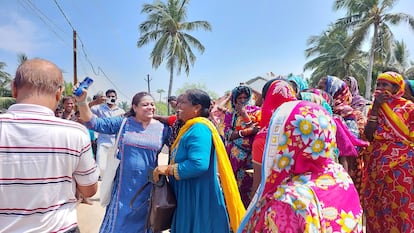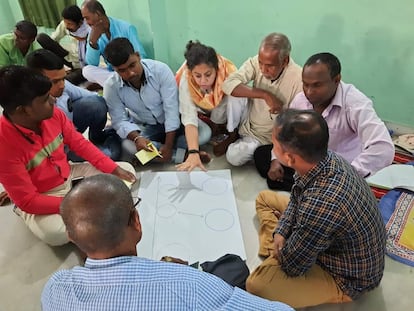Anindita Majumdar, Indian activist: ‘Women’s empowerment works better if we work with men’
This social leader promotes gender equality through her own non-profit organization, the EquiDiversity Foundation

Anindita Majumdar was born in Calcutta, India, in 1976. She still lives there. She’s the youngest daughter in a family that was part of the first generation of refugees from East Pakistan, now known as Bangladesh. Her father arrived in the Indian state of West Bengal at the age of 14 with his family, just after India’s independence in 1947. As they were Hindus, they were forced to leave all their assets in present-day Bangladesh and start over from scratch.
Majumdar enjoys talking politics with her friends and, until adolescence, she wanted to be a boy. “I ended up becoming comfortable as a woman… but in Indian culture, male children are preferred. They can be more independent, choose their futures and even go abroad. Job opportunities for women are local and limited — such as teachers or caregivers — so they can be around and have time to care for the family.”
Although the Majumdar family arranged a marriage for her against her will, in the end, they reluctantly agreed to let her reject the engagement and instead choose her own partner and pursue her studies.
Majumdar holds a Master’s degree in Science Policy and another in Philosophy of Women’s Studies. She emphasizes: “I’m fortunate to have had access to education, a real challenge for women in Indian culture.” The doors to her current life, full of inspiration and purpose, opened through her thesis, when she began while working with imprisoned women in Bengal. This scenario marked the beginning of 12 years of work in a non-profit. She was able to build bridges and create her own project in 2016: the EquiDiversity Foundation, an organization that promotes gender equity and diversity.
In the months of May and November, Indian law requires annual meetings between local governments and civil society groups to negotiate governance plans. These meetings, called gram sansad sabhas (meetings of village voters), include remote communities that are marginalized from society. And they wouldn’t occur (or they would be heavily biased) if it were not for the Women’s Empowerment Committees, or the Nari Jagran Committees. However, oftentimes, when they participate, both the communities and the women don’t know what to demand, or how to negotiate it.
“In the specific case of the last meeting, we worked with the committees to prepare women to negotiate about street lighting and [anti-rape protocols],” Majumdar details. “[We also prepared them to demand] the construction of nurseries and parks for girls and boys with special needs, so that the women can have more time for themselves. In these processes, international projects from other countries in the Global South also help us empower others.”

“We seek to avoid biased agendas and understand people’s real life stories, so as to promote the deeper self-knowledge that traditional education [neglects]. We also understand that women’s empowerment works better if we work with men.” For Anindita Majumdar, negative, conflictive and polarizing narratives don’t help. She considers it essential that women and men work together on various issues, such as self-transformation, collaboration on community projects and also learning how to identify emotions and feelings, so as to share them with family members. “Men are educated — often by women — to [hide their feelings],” she notes.
Majumdar works in the following way: “In general, we first build the trust necessary to enable collaboration between members of communities, such as families, youths, leaders and minorities in situations of marginalization. We then carry out a diagnosis to design training tailored to local idiosyncrasies. Subsequently, we provide participatory group training and [promote] alliances for sustainability. Then, we connect the communities, so that they can negotiate their agendas directly with the powers that most directly influence our systems: public administrations, political parties, or companies, among other institutions.”
Majumdar is a special and inspiring leader, who still practices her social work on the ground, backed up by rigorous knowledge. She’s well aware of the systemic process of sharing power and, therefore, the need for comprehensive, rather than polarizing, approaches and narratives, so that people can find common ground.
When asked about her personal dreams, she doesn’t hesitate: “Empowering communities [and] traveling through the tribal villages of Madhya Pradesh, India, and Africa.”
Sign up for our weekly newsletter to get more English-language news coverage from EL PAÍS USA Edition
Tu suscripción se está usando en otro dispositivo
¿Quieres añadir otro usuario a tu suscripción?
Si continúas leyendo en este dispositivo, no se podrá leer en el otro.
FlechaTu suscripción se está usando en otro dispositivo y solo puedes acceder a EL PAÍS desde un dispositivo a la vez.
Si quieres compartir tu cuenta, cambia tu suscripción a la modalidad Premium, así podrás añadir otro usuario. Cada uno accederá con su propia cuenta de email, lo que os permitirá personalizar vuestra experiencia en EL PAÍS.
¿Tienes una suscripción de empresa? Accede aquí para contratar más cuentas.
En el caso de no saber quién está usando tu cuenta, te recomendamos cambiar tu contraseña aquí.
Si decides continuar compartiendo tu cuenta, este mensaje se mostrará en tu dispositivo y en el de la otra persona que está usando tu cuenta de forma indefinida, afectando a tu experiencia de lectura. Puedes consultar aquí los términos y condiciones de la suscripción digital.








































